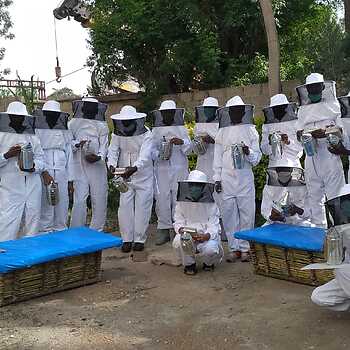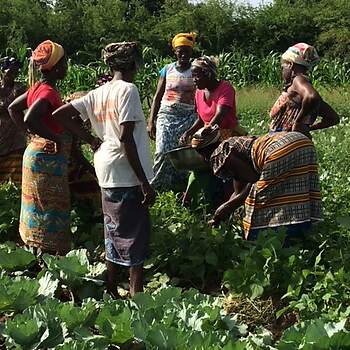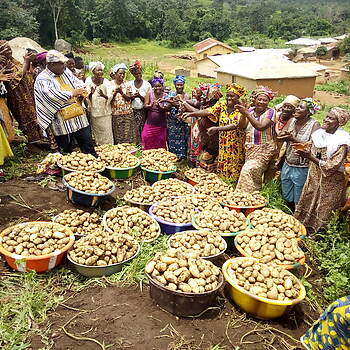WDR 2008
The 2008 World Bank’s World Development Report was a wake-up call to refocus on agricultural and rural development as an economic sector that lays the foundation for further industrial development in most developing countries (exceptions are countries that can mobilise mineral and oil wealth and are prepared to invest in broad-based inclusive economic development).
Between 2007 and 2016, Dutch Official Development Assistance (ODA) expenditures for agriculture and food security tripled, amounting on average to 300 million Euros per year during this period.
Dutch policy focus on private sector involvement
In the Netherlands the 2008 policy note on agriculture, rural entrepreneurship and food security set the stage for a predominantly private sector led approach to promote agricultural value chains, support farmers’ organizations, and create an enabling environment for agricultural development. In this document, the need to provide safety nets for vulnerable segments of the population in LDCs was also emphasized.
Kamer brief voedselzekerheid 2011 https://zoek.officielebekendmakingen.nl/kst-32605-54.html
African Union/NEPAD Comprehensive African Agricultural Program (CAADP)
In 2003 African heads of state committed at the African Union (AU) summit in Maputo to increase investment in agriculture (aiming for at least 10% of national budgets) with the goal to raise productivity by 6% annually. But it was only in 2008 when the World Bank’s World Development Report argued that for many developing countries agricultural development was a precondition for industrial development, that donors re-engaged in agriculture in partner countries.
During this period, although the private sector was recognized as the catalyst for agricultural development, the role of government was re-emphasized as a policy making and regulatory body with a specific focus on reducing rural poverty, increasing revenues from agricultural trade and feeding the burgeoning urban populations. In Africa this led to adoption of the AU Comprehensive Africa Agricultural Development Program (CAADP). The Netherlands provided support through a multi-donor trust fund and supported the European Centre for Development Policy Management (ECDPM) and the International Food Policy Research Institute (IFPRI) to play a role in the Regional Strategic Analysis and Knowledge Support System (ReSAKSS), focusing on capacity building for agricultural planning and monitoring progress on CAADP indicators. The Netherlands was also an active member of the CAADP donor coordination group. CAADP received new impetus in 2014 when the AU Heads of State endorsed the Malabo Declaration, a more detailed and comprehensive set of targets to create momentum for agricultural development and food security.
Agricultural research and technical assistance
In the meantime, international and Dutch research institutions continued to advocate for and provide technical assistance for agricultural development. Efforts, strongly supported by the Netherlands, were underway to reform international agricultural research through institutional reforms and the introduction of CGIAR system wide research programs. At a later stage, strong partnerships were forged between Dutch knowledge institutions and the CGIAR.
Dutch multi-stakeholder approaches: Dutch Diamond (DGIS) and Golden Triangle (LNV)
From 2012 onwards the Dutch Ministry of Foreign Affairs used and promoted the ‘Dutch Diamond Approach to Sustainable Development’ within food systems. The approach engaged the private sector and recognized the value addition of government, the private sector, civil society and knowledge institutions working in partnership to realize development results. Within the Dutch Diamond Approach, the competences of partners were combined and the various goals, funds, risks and responsibilities were pooled. The corporate working practices and market-oriented methods of the private sector were linked with the local knowledge of civil society organizations (CSOs). Knowledge institutions contributed their expertise, while governments acted as brokers and co-financers.
Around 2009 LNV (at the time within the Ministry of Economic Affairs and Agriculture) used and promoted the ‘Golden Triangle Approach’. To this end, the government, the business community, and research and knowledge institutions formed a ‘golden triangle’. In 2011- strengthened with the top sectors policy of the Dutch government - so-called Agricultural Top-sectors were identified that are critical to the Dutch economy and employment, in which the Dutch government wanted to stimulate innovation. Wageningen University & Research (WUR) was an important player in this triangle and actively contributed to the Top Sectors ‘Agri & Food’ and ‘Horticulture and Propagation Materials’ in particular. In these sectors, WUR played a role as knowledge partner in Public-Private Partnership initiatives (PPPs).


